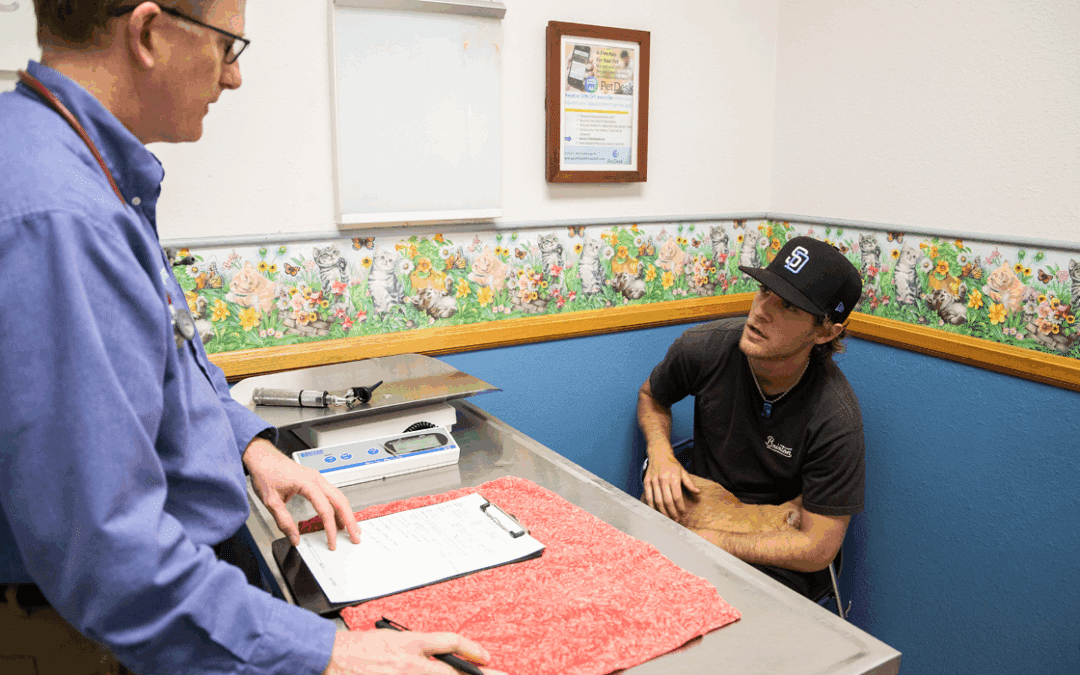Veterinary professionals are also professional multitaskers, but oftentimes they find themselves juggling administrative burdens that can put their mental and physical well-being at risk and distract them from providing the best care possible. From overwhelming amounts of work to the emotional toll of clinic life, veterinary staff face high risks of occupational burnout and compassion fatigue in their everyday operations. It’s a growing crisis, but thankfully one that teams can better navigate with the right information, strategies, and tools—all of which we’re covering in detail to help veterinary professionals like you have a stronger sense of pride in the work they do.
The causes of stress and compassion fatigue for veterinary professionals
Clinics experience a number of stress factors, especially when it comes to treating critically sick or injured patients and finding the best solutions for pet owners to consider. As veterinary professionals continue to develop throughout their career, the amount of stress increases while their mental resilience tends to decrease. This can lead to veterinary workers sacrificing their own work-life balance and well-being for the betterment of the clients and patients they serve, like by working after hours and being available at all times of the day for veterinary support and knowledge.
Although it’s an admirable, selfless act, it’s also the perfect storm for compassion fatigue and burnout. That’s why knowing the warning signs is key for helping to identify, address, and prevent psychological stressors in your veterinary clinic.
Symptoms to look out for:
Recognizing these risk factors early is crucial for getting ahead of more severe cases of occupational burnout or emotional breakdowns.
- Withdrawal: Losing interest in work activities, social interactions, or hobbies.
- Anxiety: Feeling constantly worried, overwhelmed, or out of control.
- Low Self-Confidence: Doubting your abilities or feeling like you’re making constant mistakes.
- Decreased Morale: Developing a cynical or negative outlook toward work and the overall profession.
- Disassociation: Going through the routine motions at work without feeling emotionally present and engaged.
- Behavioral Changes: Resorting to harmful habits, such as substance abuse or other risky behaviors.
- Decreased Patient Interaction: Struggling to connect with patients or clients.
- Missed Work or Tardiness: Frequently being late or not showing up for work at all.
- Career Apathy: Losing interest in professional advancement and career development.
Organizational support: a key to prevention at your veterinary clinic
A supportive clinic is a more successful one because it offers a positive environment where every person and pet can flourish, without causing additional levels of stress. Organizational support is one of the most effective ways to combat stress and compassion fatigue, and here are a few ways practices can actively foster a supportive workplace where staff feel as valued and cared for as the clients and patients they serve.
- Flexible Work Arrangements: Where and when possible, allow for remote work, flexible hours, or reduced workweeks to help staff balance their personal and professional lives.
- Mental Health Resources: Equip your team with access to counseling, therapy, or support groups specifically tailored to veterinary professionals.
- Employee Assistance Programs (EAP): Offer confidential counseling and support services for both personal and work-related issues.
- Stress Management Workshops: Conduct training sessions on stress reduction techniques, mindfulness, and relaxation practices.
- Peer Support Groups: Encourage staff to form support groups where they can share experiences and provide empathy to colleagues.
Individual strategies for managing stress in the veterinary industry
Along with a supportive organization, veterinary professionals should be encouraged to take control of their own well-being as much as possible. It’s important for each team member to consider developing personal strategies for managing stress and maintaining a strong work-life balance.
- Self-Care: Exercise, hobbies, or spending time with loved ones are all positive activities you can promote to your team.
- Time Management: Teach different ways your staff can prioritize tasks and lower the feeling of being overwhelmed.
- Healthy Lifestyle: Encourage staff to maintain healthy eating habits, get enough sleep, and exercise regularly so they wake up feeling recharged and ready for work.
- Mindfulness and Meditation: Guide professionals in mindfulness and meditation techniques to help reduce stress and improve emotional well-being.
- Limit Social Media Exposure: Suggest that staff limit their exposure to distressing animal-related content online to avoid further emotional exhaustion.
Community support: building a network of care
You can further alleviate the impacts of compassion fatigue by connecting like-minded individuals or getting more involved in the community. The negative feelings of isolation can contribute to professional exhaustion; veterinary clinics need to provide their hard-working teams with community-building opportunities to keep each employee engaged and motivated to do their absolute best work in the most efficient way they can.
- Volunteer Opportunities: Get your staff involved with volunteer activities that align with their passions, which can offer a sense of purpose outside of the clinic.
- Community Outreach: Organize events to raise awareness about animal welfare and foster connections within the veterinary community.
- Support Groups: Establish or join support groups for veterinary professionals and their families, offering a safe space to voice their concerns and share solutions.
12 ways to defeat stress and compassion fatigue
Knowing how to identify and, most importantly, address clinic stressors is an absolute must for staying healthy in the veterinary profession and preventing compassion fatigue.
- Try to Let Go: Accept that not every outcome is within your control, and you can only do your absolute best to promote the best healthcare.
- Focus on Response: Control what you can—which is your response to challenges. Don’t focus as much on the outcomes and instead concentrate on what you can learn from the challenges you have and have yet to overcome.
- Practice Mindfulness: Use mindfulness and meditation to reduce anxiety and improve your mental clarity. A few well-done, deep breaths can go a long way.
- Recognize Your Efforts: Acknowledge that you’ve done your best in any given situation, and not every aspect of a patient’s health is in your control.
- Remember Your Purpose: Reflect on why you chose the veterinary field in the first place. Mental grounding can be super beneficial for maintaining your momentum through tougher times.
- Share Knowledge: Mentor others by proactively sharing your experiences and expertise, and providing a space where you and other veterinary professionals can bounce ideas and insights off one another.
- Find Delight in Daily Tasks: You can find joy in certain routine responsibilities by admiring the positive impact you have on the clients and pets in your clinic.
- Take a Break: Grab some lunch or cash in your vacation days to unplug and recharge.
- Seek Perks: Work with vendors to organize staff lunches or small bonuses that brighten your team’s day.
- Step Outside: A brief moment of fresh air can help shift your perspective—fast.
- Plan Staff Outings: Participate in or help organize fun team-building activities outside of the clinic, like a trivia night or simply going out bowling.
- Exercise: Start a regular exercise routine to boost endorphins and improve your mood each day.
Put this knowledge into (your own) practice!
Now that you can better identify, address, and prevent daily stressors, it’s time to apply your expertise to your own practice. Stress and compassion fatigue are serious issues in veterinary medicine, but they don’t have to be career-defining. You can help to create a welcoming and supportive workplace environment by promoting self-care and building community connections for your staff so that every team member can take pride in all they do for people and their pets. The more cohesive and supportive a clinic is, the more resilient your team will be from the negative impacts of veterinary stress.
If you’re looking for a bit more information on ways to manage and reduce stress in your clinic, we’ve created Helping to Ease Psychological Stressors in Veterinary Practices. In this report, we’re supporting Not One More Vet—a leading veterinary mental health charity—to highlight the causes and impacts of veterinary stress, and how you can have more peace of mind by increasing client retention, decreasing daily pain points, and exploring additional resources for support from Not One More Vet.
See the power of PetDesk for yourself—for free
Save time and grow your business with custom websites and digital marketing, 24/7 error-free booking, a PIMS-VoIP phone system, plus a client engagement platform with a mobile app.






